Export Patient Lists for TeleVox
TeleVox is a vendor that can automatically contact your patients by phone, text, or e-mail. The instructions below will show you how to create a list of patients and transfer them to your PC or directly to TeleVox.
Note: PCC’s Patient Notification Center can help you setup reoccurring notifications and then manage and send them for you. The instructions below are for finding and exporting patients manually for TeleVox.
After performing the steps below, you can use the TeleVox program on your PC or the TeleVox web site instead of the Patient Notification Center.
Create the TeleVox Patient List
First, use Partner’s TeleVox Transfer (televox) program to create a list of upcoming appointments.
Run televox
Type televox at a command prompt or select the televox program from your Partner windows.
Input Date
Enter a date range for appointments that need reminder phone calls. Televox will call all the patients scheduled to come in between these two dates. The default range is all the appointments for today, but you can send a week’s worth of appointments at once if you wish.
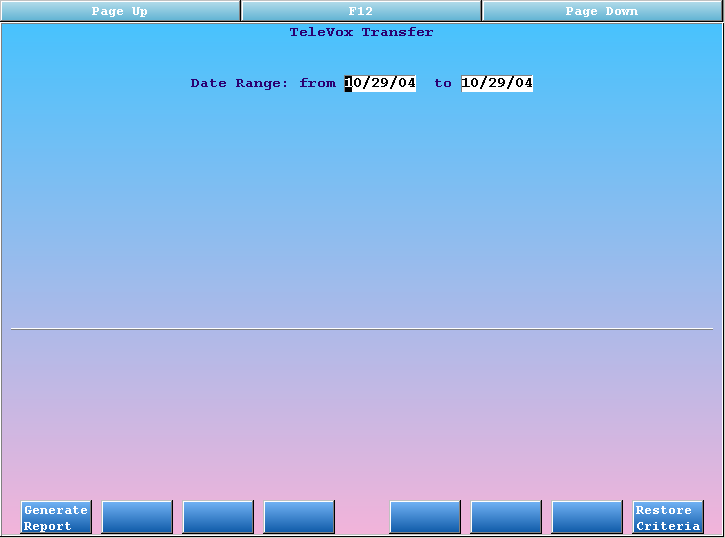
Review/Add Criteria
On the next screen, review the restriction criteria. The default settings collect all appointments for the date range entered that are either waiting for an encounter form or already have one printed. That means that canceled, deleted, missed, or posted visits will not be included in the list.
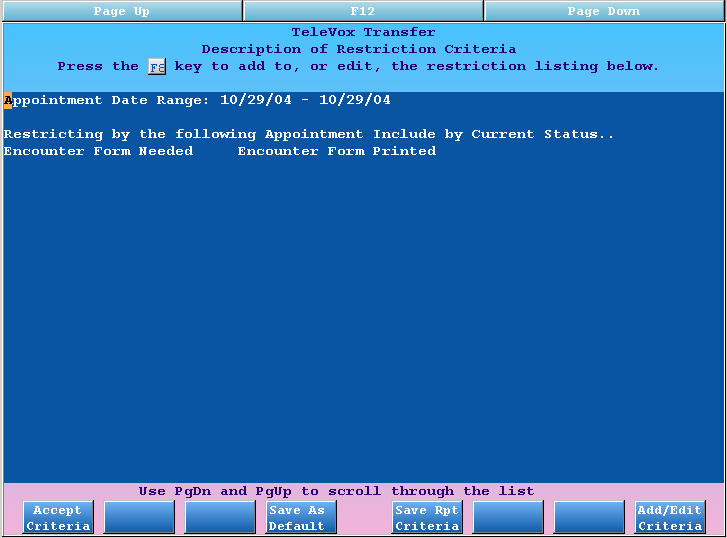
Press [fkey title=’F8′ subtitle=’Add/Edit Criteria’ display=’inline’ /] if you want to change the default settings or limit the list of appointments further. See the “Customize the Output” section below for an example.
Press F1
Press [fkey title=’F1′ subtitle=’Accept Criteria’ display=’inline’ /] to run the report and collect appointment information.
When televox finishes creating the list, it will prompt you to begin the file transfer.
Transfer the Televox List
After creating a list of patients for Televox calls, the next step is to transfer the list of patients and appointments to the automated telephone system.
There are three different methods. You can transfer the file directly to Televox, transfer it to your PC using AniTa, or transfer to your PC using TeraTerm. If you transfer the files to your PC, you can then use the TeleVox software to finish uploading the information to their Web site.
Transfer Data Directly to TeleVox
If you obtain an ssh username and password from the TeleVox company, PCC can configure an automatic transfer of patient and appointment data. This is the simplest method of running TeleVox. Contact PCC support for further assistance.
AniTa Transfer Instructions
AniTa uses the “YModem” protocol to transfer files to your PC. Once transferred, Televox can read the list and make the needed phone calls.
Trouble Transferring: Some users report problems during file transfer. If the instructions below fail to transfer your Televox file, even after rebooting your computer, consider switching to TeraTerm for creating and transferring your file. For help setting up TeraTerm, contact PCC Support at 1-800-722-1082.
Follow these steps to transfer the list:
Press F4
Press [fkey title=’F4′ subtitle=’Transfer File’ display=’inline’ /] to begin the transfer process.
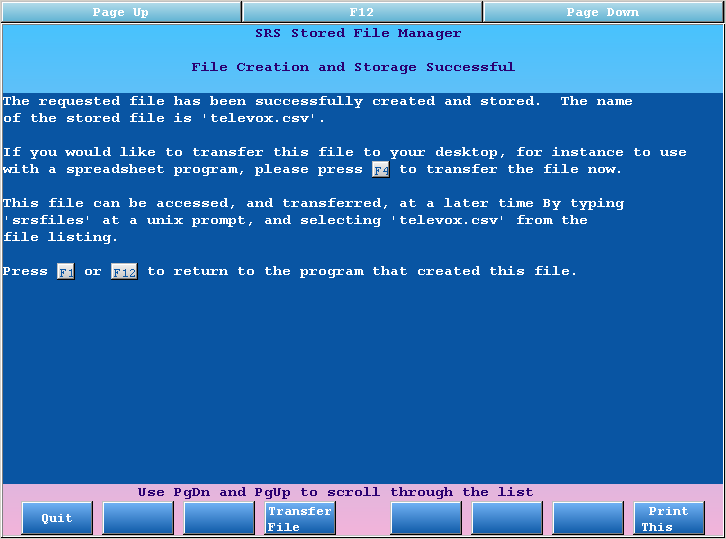
View Instructions
You will see a list of instructions describing how to perform the transfer. You can read the instructions to learn more about the process.
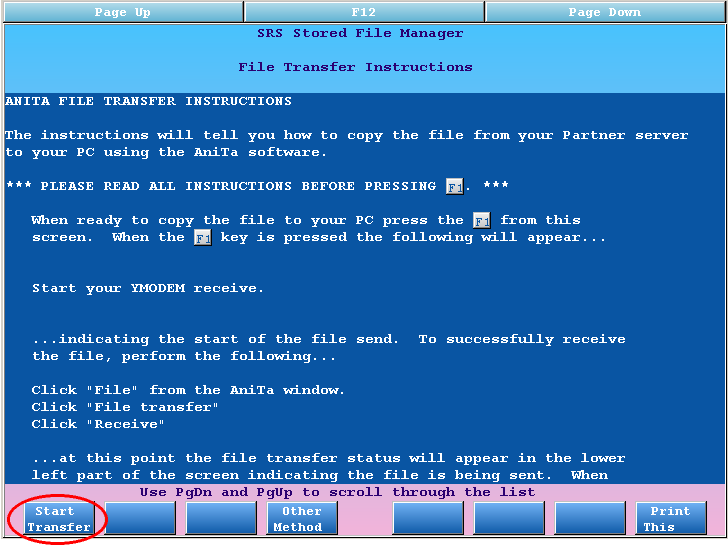
Press F1
When you are ready to transfer the file, press [fkey title=’F1′ subtitle=’Start Transfer’ display=’inline’ /]. You will see the following message:
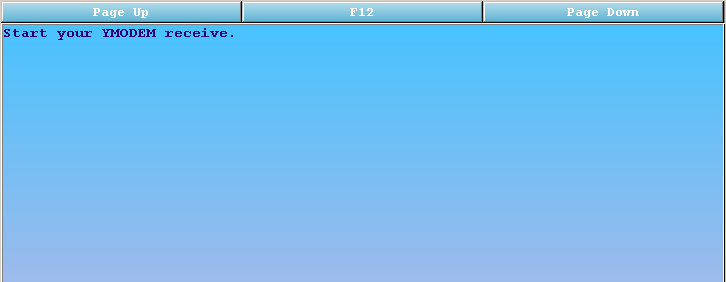
Start File Transfer
Click on the “File” menu and select “File Transfer”.
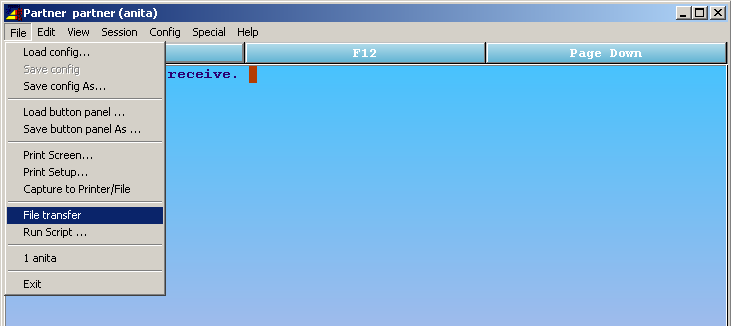
Click “Receive”
In the window that opens, click the “Receive” button to start the transfer.
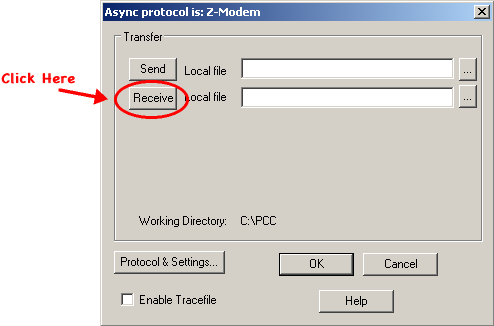
Once the transfer has finished, you can find the televox.csv file in the C:PCC directory on your PC. Your automated phone system can retrieve it from that folder.
TeraTerm Transfer Instructions
TeraTerm uses the “ZModem” protocol to transfer files to your PC. Once transferred, Televox can read the list and make the needed phone calls. Follow these steps to transfer the list:
Press F4
Press [fkey title=’F4′ subtitle=’Transfer File’ display=’inline’ /] to begin the transfer process.
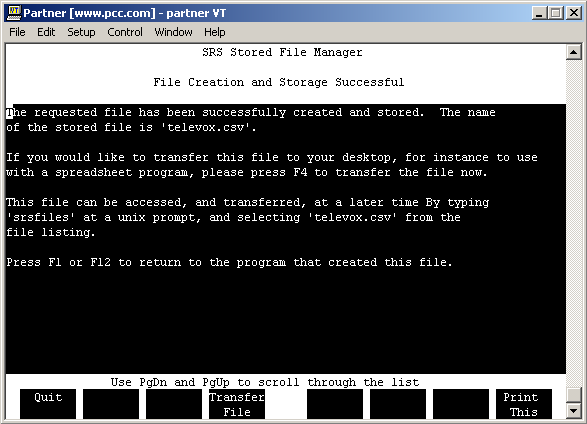
View Instructions
You will see a list of instructions for performing the transfer. You can read the instructions to learn more about the process, including how to change the directory in which the file will be saved.
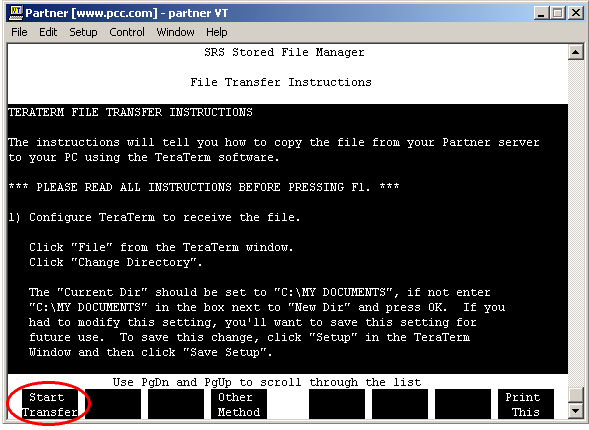
Press F1
When you are ready to transfer the file, press [fkey title=’F1′ subtitle=’Start Transfer’ display=’inline’ /]. You will see the following message:
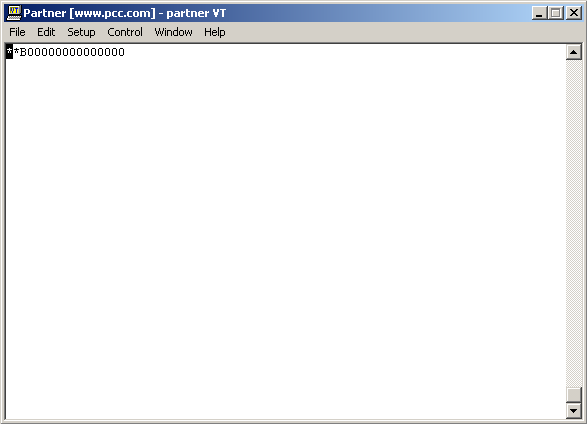
Begin Transfer
Click on the “File” menu and select “Transfer”, “ZMODEM” and “Receive”, as shown below:
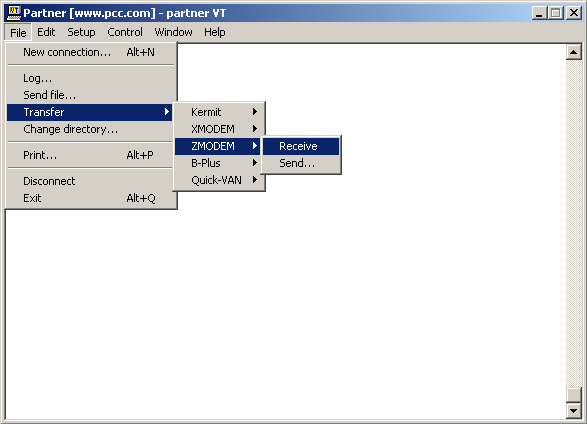
After the transfer is completed, you can find the televox.csv file in the TeraTerm directory (C:Program FilesTTERMPRO). Your automated phone system can retrieve it from that folder.
Filter Patients for TeleVox
Do you have a list of patients who do not wish to receive phone call reminders? Perhaps you only send out reminders for certain visit reasons? While you are running televox, you can add restrictions to limit which patients your telephone system will call.
Press F8
From the “Description of Restriction Criteria” screen, press [fkey title=’F8′ subtitle=’Add/Edit Criteria’ display=’inline’ /] button.
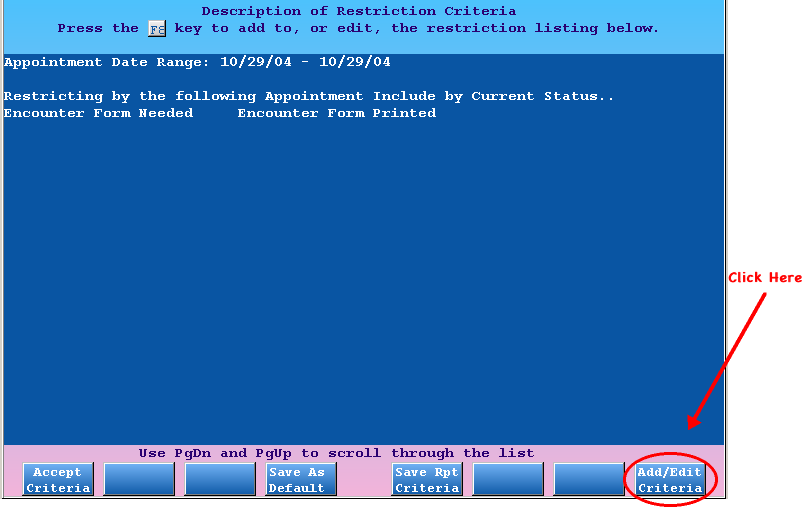
Select Additional Criteria
The default criteria is by appointment status. Canceled visits or visits that have charges posted will not require a phone call. In the example below, we added the additional criteria of visit reason and custodian status flags:
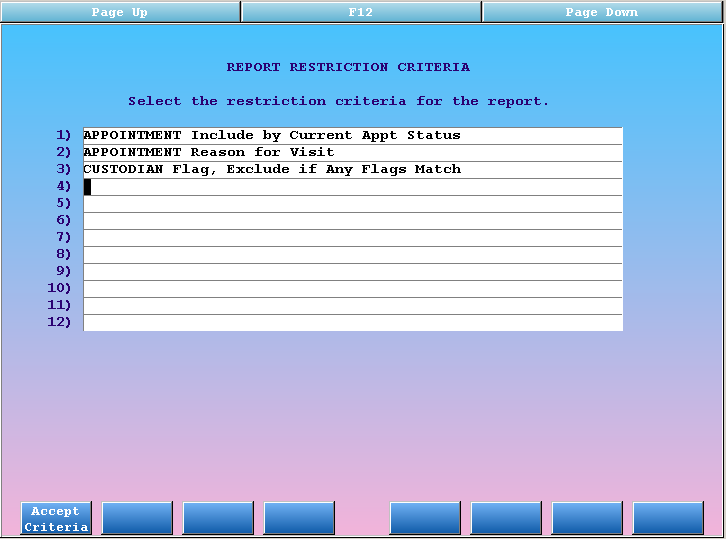
After selecting the criteria, press [fkey title=’F1′ subtitle=’Accept Criteria’ display=’inline’ /] to continue.
Verify Appointment Statuses to Include
Next, verify the appointment statuses to be included. The default behavior is usually correct:
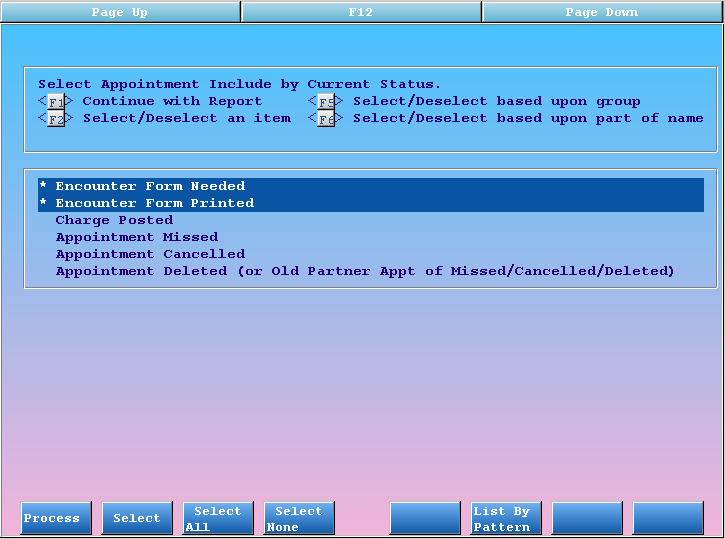
Press F1 to continue.
Specify Behavior for Each Criteria
Next, specify behavior for the other criteria you added. You will be shown one screen for each criteria. The examples below show both the visit reason and “Custodian – Exclude by flag” criteria screens. First, we select visit reasons:
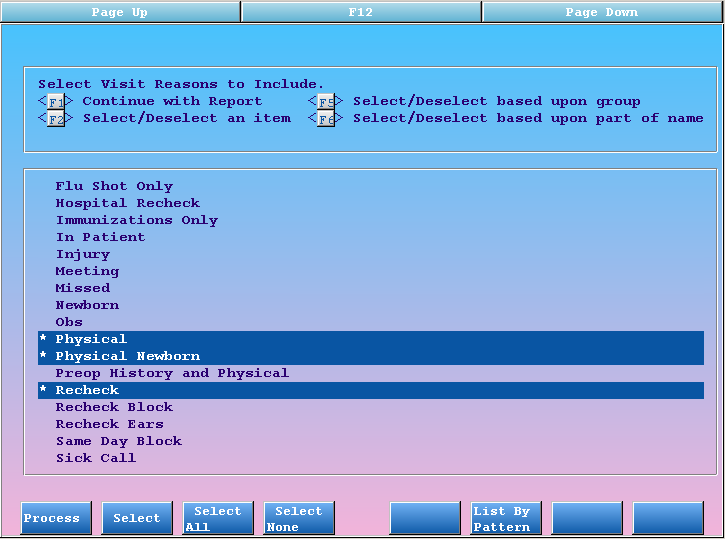
Press F1 in between each criteria screen to move on to the next one. In the image below, we set which Custodian Status Flags to exclude from our list:
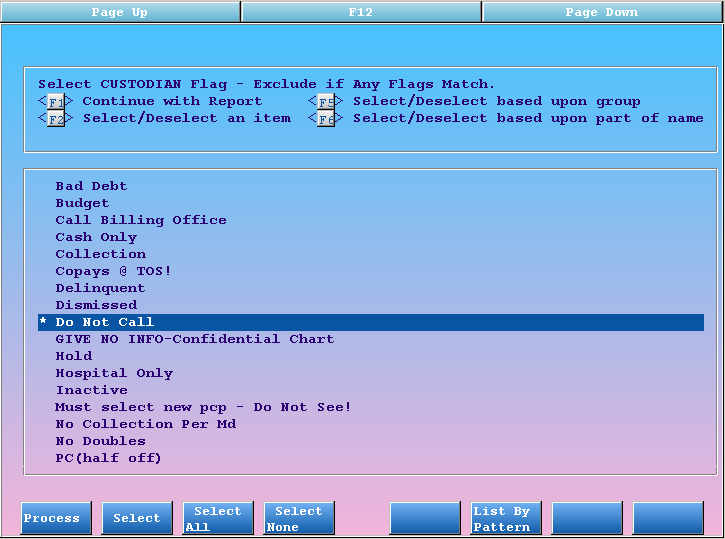
Press F1 again to process your selection.
Review Your Selections and Run the Report
Back on the Restriction Criteria screen, check your work to make sure you have selected appropriate criteria. Press [fkey title=’F4′ subtitle=’Save As Default’ display=’inline’ /] to save your choices as a new default. You can also press [fkey title=’F5′ subtitle=’Save Rpt Criteria’ display=’inline’ /] to save these settings as a criteria set that you can later retrieve from the date selection screen.
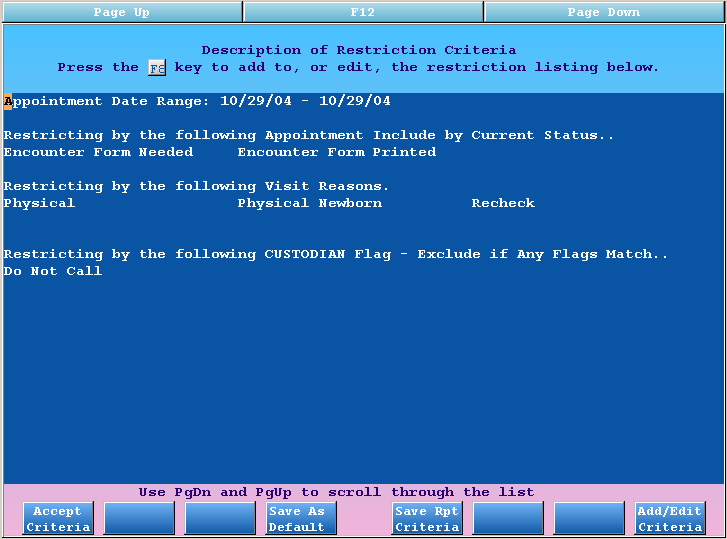
Press [fkey title=’F1′ subtitle=’Accept Criteria’ display=’inline’ /] to continue running your report.
Read More: The televox program uses the same report engine as the Smart Report Suite (srs). To learn more about the criteria functions, read the Smart Report Suite guide
